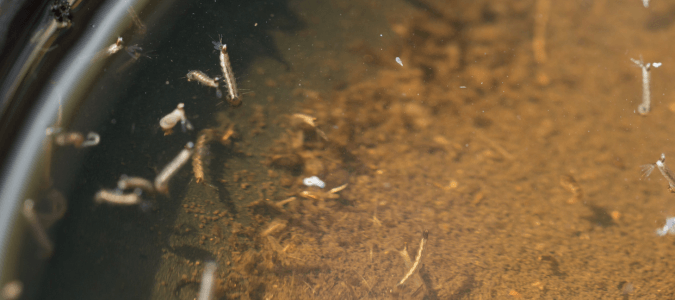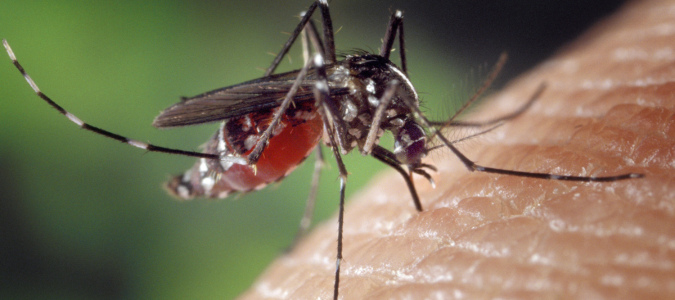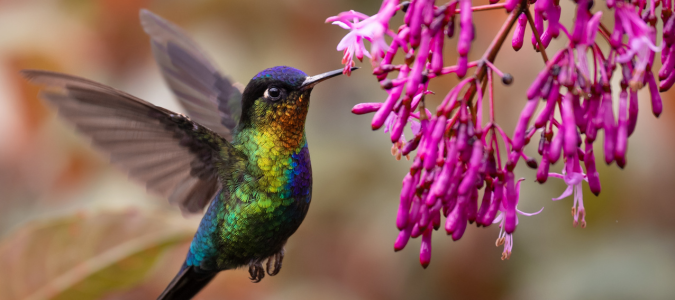What To Do About Mosquito Larvae in Water Bowls

What To Do About Mosquito Larvae in Water Bowls
Many mosquito species lay their eggs in water, where the insects undergo multiple life cycles before emerging as adults and flying away. One of those life cycles is the larva stage. Mosquito larvae sit at the surface of water and feed on organisms before entering the pupa stage.
Mosquito larvae are worm-like aquatic creatures known as “wrigglers” because of how they move. They measure between one-fourth and one-half of an inch in length and are translucent in color.
Their bodies have several distinct segments, including the head and abdomen. Mosquito larvae are also known for their siphon air tubes, which they use to take in air above the water’s surface.
It’s common to find mosquito larvae in your pets’ water bowls, especially if the bowls are outside. Pet water bowls are the perfect environment for mosquitoes to lay eggs. However, it’s not good for your pet to drink water from a bowl infested with mosquito larvae, eggs or pupae because mosquitoes can carry heartworms.
Since mosquito larvae are translucent, it’s hard to see them unless you’re looking for them. If you have pet water bowls outside, routinely check them for pests. If you see mosquito larvae in your pet bowl, dump out the water.
Next, thoroughly clean the bowl with soap and water to remove all the mosquito larvae and other pests that may have entered the bowl.
To deter female mosquitoes from laying their eggs in your pet’s water bowl in the future, get into the habit of refreshing the water daily. Mosquitoes look for standing water to lay their eggs, so the more often you refresh your water bowls, the less chance that mosquito larvae have of surviving.
Why You Need to Avoid Mosquito-Borne Diseases
As a pet owner, protecting your pet from contracting a mosquito-borne disease is important. Drinking from an infested water bowl is one way to pick up a disease from a mosquito, so it’s important to stay vigilant. It’s also important to protect yourself and your family members from mosquito-borne diseases by deterring these pests from your property.
Here are a few examples of the diseases that mosquitoes can carry:
- West Nile Virus
- Malaria
- Yellow Fever
- Dengue
- Zika Virus
- Chikungunya
Mosquitoes can also carry heartworm, which is very dangerous for dogs. It’s important to remember that only adult female mosquitoes can carry diseases and parasites. The egg, larva and pupal stages, as well as male mosquitoes, cannot carry diseases.
How to Deter Mosquitoes From Your Property
The first step to deterring mosquitoes is to make your property less attractive to them. Mosquitoes need places to lay their eggs. As mentioned above, many species lay them in standing water. Eliminating sources of standing water on your property can help deter these unwanted pests.
Standing water sources may include:
- Water bowls
- Wheelbarrows
- Fountains
- Flowerpot saucers
- Bird baths
- Faulty gutters
- Buckets of rainwater
Walk around your property to identify all the standing water sources you can, and empty each one.
Next, clear away debris from your yard, such as piles of leaves and branches. Debris piles often make excellent nesting and hiding spots for mosquitoes. Clogged gutters are also a perfect breeding ground for mosquitoes, so it’s important to keep your gutters clear, especially after a big storm.
The most effective way to deal with a mosquito problem is to contact a pest control specialist. An expert can identify all the areas on your property where mosquitoes are hiding and laying eggs, and can implement different treatments. They can also teach you how to prevent mosquito bites on dogs.
Do Hummingbirds Eat Mosquitoes?
Did you know that hummingbirds eat mosquitoes? If you have hummingbirds on your property, they could help minimize the mosquito population. However, hummingbirds alone are not enough to deal with a mosquito infestation.
Since mosquitoes reproduce rapidly, even multiple hummingbirds on your property cannot eat enough to make a significant difference on your property. Plus, mosquitoes are only a small part of the hummingbird diet.
The best approach to dealing with a mosquito infestation is to combine the natural help from hummingbirds with more effective professional pest control strategies that target mosquitoes.
Targeting Mosquitoes at Every Stage of the Life Cycle
The best way to deal with a mosquito infestation is to control them at every stage of their life cycle. It is not enough to simply control the adults, which is another reason that relying on hummingbirds to eat mosquitoes is not an effective strategy.
Instead, you need to control mosquitoes at the egg, larva and pupa stages as well as at the adult stage.
Mosquito eggs, larvae and pupae are tiny organisms that are hard to see if you are not professionally trained. The best way to deal with them is to work with a pest control specialist who knows what they’re looking for and the common mosquito hiding places. If you’re dealing with a mosquito problem on your property, call in a pest control service to handle the problem.

Where Do Mosquitoes Live?
There are thousands of mosquito species, and each species has its own set of preferences. When it comes to their living conditions, some mosquito species prefer to live in urban areas around humans. In contrast, others prefer to live in forests and other natural habitats away from human activity.
Mosquitoes that prefer urban or suburban environments often breed and lay their eggs in artificial containers. Flowerpots, clogged gutters and pet water bowls are common living spaces for urban mosquitoes.
On the other hand, mosquito species that prefer natural habitats typically shelter in tall grasses and lay their eggs in ponds, marshes and other standing water sources.
Despite their differing preferences, all mosquitoes are united in their need for food and water and will adapt their preferences to meet their needs. For example, a mosquito species that typically lives in natural habitats will adapt to living in an urban area if they can easily access shelter, food and water.
No matter what kind of setting they live in, standing water makes a habitat attractive to mosquitoes. Knowing this fact about mosquitoes can help you deter them from your property. It’s important to inspect your property for standing water sources and eliminate them to keep mosquitoes away.
More Ways to Keep Mosquitoes Off Your Property
Other mosquito-prevention methods can help keep these pests away. For starters, maintaining a tidy yard can eliminate potential hiding places for mosquitoes. These pests appreciate piles of leaves, branches and debris that they can use as shelter and a breeding ground.
Mosquitoes also love tall grasses, so keeping your lawn neat and trimmed can go a long way in eliminating the problem.
There are also other unsuspecting areas that can accumulate water and become mosquito breeding grounds, such as trash bin lids and old tires. Keep your trash bins sealed tightly to avoid water accumulation.
Are you wondering where else mosquitoes could be hiding on your property? The best thing you can do is contact a pest control specialist to inspect your property. An expert will have the right tools, experience and products to reduce mosquito populations and restore your peace.
Control Mosquitoes With Professional Help
Mosquitoes can carry several diseases that are dangerous to pets and humans, so it’s wise to act quickly when you have a mosquito problem on your property. Working with a pest control specialist is the most effective way to deal with an infestation. An expert can find where the mosquitoes are hiding, target them and put prevention methods in place for the future. They can even teach you about the different types of mosquitoes, like the southern house mosquito.
Chem-free Can Reduce Mosquito Populations on Your Property
Mosquitoes can make you miserable. If you’re ready to limit the number of mosquitoes buzzing around your property, contact Chem-free Pest Control. We offer holistic methods of mosquito control that have your family in mind. This way, you can feel comfortable at home again.
Need Help Managing Pests?
Chem-Free offers both effective, low-impact pest control options and preventative measures to help avoid future infestations. Contact us today for a free estimate!



